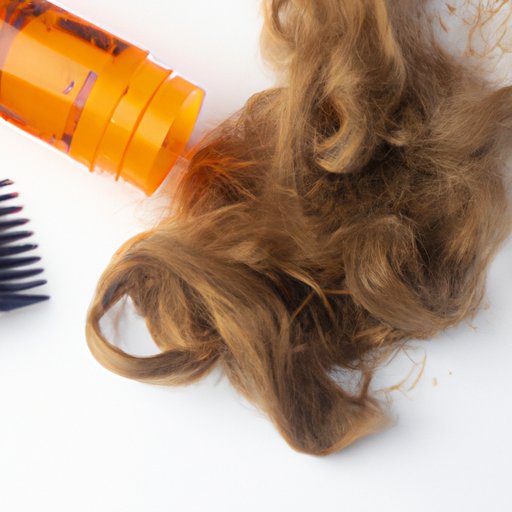Introduction
Damaged hair can be frustrating and difficult to manage. It is often dry, brittle, and prone to breakage and split ends. Understanding the causes of damage is essential for developing an effective routine for caring for damaged hair. In this article, we will explore how to care for damaged hair at home.
Definition of Damaged Hair
Damaged hair is hair that has been weakened or broken due to environmental factors, excessive styling, chemical treatments, or other factors. It is often characterized by split ends, dryness, brittleness, and breakage. Damaged hair can also appear dull and lifeless.
Overview of Common Causes of Damage
Damage to your hair can be caused by a variety of factors, including UV exposure, chemical treatments, overstyling, and excessive heat. Other common causes of damage include coloring, bleaching, perming, and straightening. Additionally, environmental factors such as pollution, wind, and sun can contribute to the weakening of your hair.

How to Care for Damaged Hair at Home
Caring for damaged hair at home is possible with the right techniques and products. Here are some tips for caring for damaged hair at home:
Use a Deep Conditioning Treatment Once a Week
Using a deep conditioning treatment once a week can help restore moisture to your hair and make it look healthy and shiny again. Look for a deep conditioner that contains natural oils like argan oil or coconut oil, which can help nourish and protect your hair from further damage.
Avoid Over-Shampooing Your Hair
It is important to avoid over-shampooing your hair, as this can strip away essential oils and moisture from your strands. When washing your hair, focus on the scalp and massage the shampoo into the roots. Rinse thoroughly, and then apply conditioner to the mid-lengths and ends of your hair.
Use a Mild, Sulfate-Free Shampoo
When choosing a shampoo, opt for a mild, sulfate-free formula that won’t strip away too much moisture from your hair. Sulfates can be harsh on the hair and can lead to further damage. Look for shampoos that contain natural ingredients like aloe vera, which can help soothe and nourish the hair.
Use a Wide-Toothed Comb to Detangle Wet Hair
It is important to use a wide-toothed comb when detangling wet hair. This will help prevent breakage and split ends. Start at the bottom and work your way up, gently combing through any knots or tangles. Avoid using a brush, as this can cause further damage to your hair.
Use a Heat Protectant When Styling With Heat Tools
When using heat tools to style your hair, it is essential to use a heat protectant product. This will help protect your hair from heat damage and keep it looking healthy and shiny. Look for products that contain natural oils like coconut oil or argan oil, which can help nourish and protect the hair.
Limit the Use of Hair Styling Products
Using too many styling products can weigh down your hair and cause further damage. Try to limit the use of styling products and opt for products that are free of harsh chemicals. When you do use styling products, make sure to wash them out of your hair after each use.
Trim Your Ends Regularly
Getting regular trims is essential for keeping your hair healthy and preventing further damage. Trimming your ends will help get rid of split ends and keep your hair looking healthy and manageable. Aim to get a trim every 6-8 weeks.
Conclusion
By following these tips, you can effectively care for your damaged hair at home. Using a deep conditioning treatment once a week, avoiding over-shampooing, using a mild, sulfate-free shampoo, using a wide-toothed comb to detangle wet hair, using a heat protectant when styling with heat tools, limiting the use of hair styling products, and trimming your ends regularly can help restore moisture and shine to your hair and keep it looking healthy and strong.
(Note: Is this article not meeting your expectations? Do you have knowledge or insights to share? Unlock new opportunities and expand your reach by joining our authors team. Click Registration to join us and share your expertise with our readers.)
